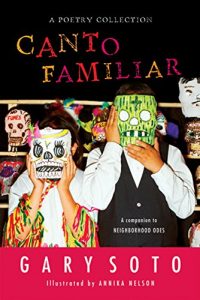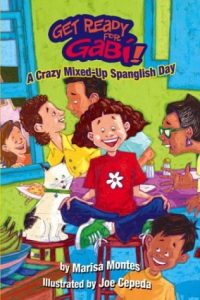 Part of the Get Ready for Gabi Series. In Northern California, Maritza Gabriela Morales Mercado struggles to deal with the third grade.
Part of the Get Ready for Gabi Series. In Northern California, Maritza Gabriela Morales Mercado struggles to deal with the third grade.
Bilingual
Canto Familiar
Just Like Home/Como en mi Tierra
A young girl’s first sights and experiences in the United States are sometimes familiar “just like home.”
Bebe Goes To The Beach
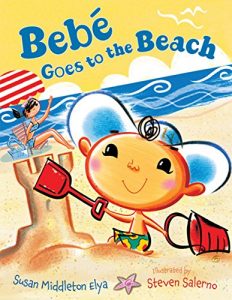 Mama leaves the shopping behind to spend a relaxing day at the beach. But sweet Bebe won’t sit still! He toddles after the waves, chases a bouncing pelota, and even surfs on a sand sculpture. When Bebé finally tuckers out, Mama gets her chance to soak up el sol. Mama and Bebe spiced things up in their first book together, Bebe Goes Shopping–and now they’re at it again! Includes a glossary of Spanish words.
Mama leaves the shopping behind to spend a relaxing day at the beach. But sweet Bebe won’t sit still! He toddles after the waves, chases a bouncing pelota, and even surfs on a sand sculpture. When Bebé finally tuckers out, Mama gets her chance to soak up el sol. Mama and Bebe spiced things up in their first book together, Bebe Goes Shopping–and now they’re at it again! Includes a glossary of Spanish words.
Brujas, Lechuzas Y Espantos / Witches, Owls And Spooks
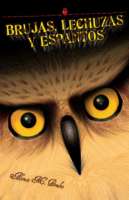
In this bilingual collection of five stories, Don Cecilio tells the neighborhood children stories that make their hair stand on end. \”In my barrio they told the story…\” and so his cuento would begin. In \”The Owl and the Bundle,\” young Tomas disappears without a trace. Distraught, his parents and siblings look for him everywhere with no luck. Upon returning home, his father sees something curious, an owl flying above the house carrying a bundle with its talons. \”Is it possible,\” he wonders, \”that the bundle is Little Tomas?\” Could the owl have taken their precious son? Based on oral tradition, these stories featuring witches, owls, and other spooky creatures have been told in Spanish-speaking barrios for generations. Now, this new edition with a first-ever English translation provided by John Pluecker will entertain and terrify a new generation of English- and Spanish-speaking children with the supernatural tales of the Hispanic community. Originally published in Spanish in 1972 as La Lechuza: Cuentos de mi barrio (The Naylor Company), Brujas, lechuzas y espantos / Witches, Owls and Spooks will fascinate children interested in scary stories and at the same time will provide a window into a different time and place, when people lived a more rural life and winged shadows flitted across the darkened countryside.
Uno, Dos, Tres, Posada! Let’s Celebrate Christmas
A posada is an important Latino holiday tradition that happens all over the world on each of the nine nights before Christmas. There’s a lot to do every night before the party can begin, and here a little girl guides us through each step—from putting out poinsettias to hanging the piñata—as she counts to ten in English and Spanish. Young readers can follow along by counting the different items mentioned. An author’s note at the end of the story further explains the origins of the posada. Sprinkled with Spanish vocabulary and filled with lively illustrations, this is a posada no one should miss!
Family/Familia
 Young Daniel doesn’t share his dad’s excitement over going to the family reunion. What’s the big deal? It’s just going to be a bunch of old people he doesn’t know, sitting around and telling stories about other old people he doesn’t know. Once there, though, Daniel is in for several pleasant surprises.
Young Daniel doesn’t share his dad’s excitement over going to the family reunion. What’s the big deal? It’s just going to be a bunch of old people he doesn’t know, sitting around and telling stories about other old people he doesn’t know. Once there, though, Daniel is in for several pleasant surprises.
Quinito, Day and Night/Quinito, Día y Noche
From dawn till dusk, Quinito’s life is full of opposites. In the morning, he’s up and running – fast or slowly, depending on the day. If it’s sunny, he’s off to the park to swing high and low. If it’s a rainy, stay-at-home day, Quinito’s quiet at naptime and noisy at playtime. So much to do before the sun sets! This playful story builds awareness in young readers that everywhere they look, opposites abound. Told in both English and Spanish, Quinito, Day and Night is a delight for readers young or old, tall or short, messy or neat.
Sundays on Fourth Street / Los Domingos En La Calle Cuatro
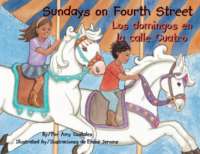
”My cousin Pepe combs my hair back just like his, and Aunt Pilar laughs. Then she slides her red lipstick across my lips, but Mama wipes it off because I’m too young. Mama puts on her new jeans, and Aunt Pilar polishes her high heels. Uncle Armando finishes washing his old car.” And then, a young girl and her family pile into the shiny car, grown-ups in the front, and kids in the back, and head to Fourth Street.Sundays spent on Fourth Street are magical, family outings that three young cousins eagerly anticipate. Strolling down Fourth Street with their parents, the children encounter a bustling wonderland filled with music, food, and fun. The cousins savor sharp bursts of flavor from mangos on a stick covered with lemon, chili and salt; delight in the sight of folk dancers spinning in the plaza; revel in rides and raffles at the church carnival; and yearn for clothes and toys they see in shop windows. While the children may not get the things that so often catch their attention, they can always look forward to more fun together next Sunday on Fourth Street. Based on real-life visits to Fourth Street in Santa Ana, California, author Amy Costales has written a story that pays homage to a special street and, more importantly, time spent with loved ones. Paired with Elaine Jerome’s colorful illustrations that depict lively street scenes, readers of all ages will enjoy Sundays on Fourth Street.
Numero Uno
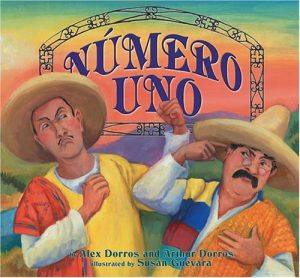 A bilingual picture book that will be #1 this spring! From a talented team, this hilarious tale of competition run amok is told with a sprinkling of Spanish and a heaping spoonful of charm. Which is better, brains or brawn? In a small village, Hercules is known for his great strength and Socrates for his keen intelligence. Whenever the villagers have a problem, they go to one or the other for help. Each man believes that he is the most important person in town. And the two fight about it constantly. Who, their neighbors wonder, will resolve the question that instigates all this bickering? The villagers realize they must settle the argument once and for all by finding out who is “número uno.” They devise a clever test, and Hercules and Socrates, each sure he will win, go along with it. The answer is a surprise for everyone “I came up with the idea for Número Uno in sixth grade when the class was asked to write fables. I thought that these two characters, one with outstanding intelligence and one with exceptional brawn, would together create an entertaining story. It could also carry a valuable lesson, as fables do. The story was originally set in China, but to me it is universal. We later decided to change to a Spanish-speaking setting, which I am more familiar with. “I grew up bilingual, speaking English and Spanish, and have visited many Latin American countries, including going to school there for a short while. I’m now sixteen years old and am enjoying living in Seattle. I spend much of my free time going to the nearby mountains (like Hercules and Socrates do in the book), in my case to snowboard. I also create my own stories through taking photographs, a few of which have now been published. I stay busy with playing baseball and going to high school. “As we wrote the book, the story stayed essentially as I originally had it, though we went through seemingly endless numbers of revisions and ended up changing details in the process. Writing a book with your dad is definitely not the easiest of tasks. At some points we reminded ourselves of the bickering characters in the story. Ultimately we were able to work together to create what I hope is a book you’ll enjoy.”—Alex Dorros on the creation of Número Uno with his father Arthur Dorros
A bilingual picture book that will be #1 this spring! From a talented team, this hilarious tale of competition run amok is told with a sprinkling of Spanish and a heaping spoonful of charm. Which is better, brains or brawn? In a small village, Hercules is known for his great strength and Socrates for his keen intelligence. Whenever the villagers have a problem, they go to one or the other for help. Each man believes that he is the most important person in town. And the two fight about it constantly. Who, their neighbors wonder, will resolve the question that instigates all this bickering? The villagers realize they must settle the argument once and for all by finding out who is “número uno.” They devise a clever test, and Hercules and Socrates, each sure he will win, go along with it. The answer is a surprise for everyone “I came up with the idea for Número Uno in sixth grade when the class was asked to write fables. I thought that these two characters, one with outstanding intelligence and one with exceptional brawn, would together create an entertaining story. It could also carry a valuable lesson, as fables do. The story was originally set in China, but to me it is universal. We later decided to change to a Spanish-speaking setting, which I am more familiar with. “I grew up bilingual, speaking English and Spanish, and have visited many Latin American countries, including going to school there for a short while. I’m now sixteen years old and am enjoying living in Seattle. I spend much of my free time going to the nearby mountains (like Hercules and Socrates do in the book), in my case to snowboard. I also create my own stories through taking photographs, a few of which have now been published. I stay busy with playing baseball and going to high school. “As we wrote the book, the story stayed essentially as I originally had it, though we went through seemingly endless numbers of revisions and ended up changing details in the process. Writing a book with your dad is definitely not the easiest of tasks. At some points we reminded ourselves of the bickering characters in the story. Ultimately we were able to work together to create what I hope is a book you’ll enjoy.”—Alex Dorros on the creation of Número Uno with his father Arthur Dorros

